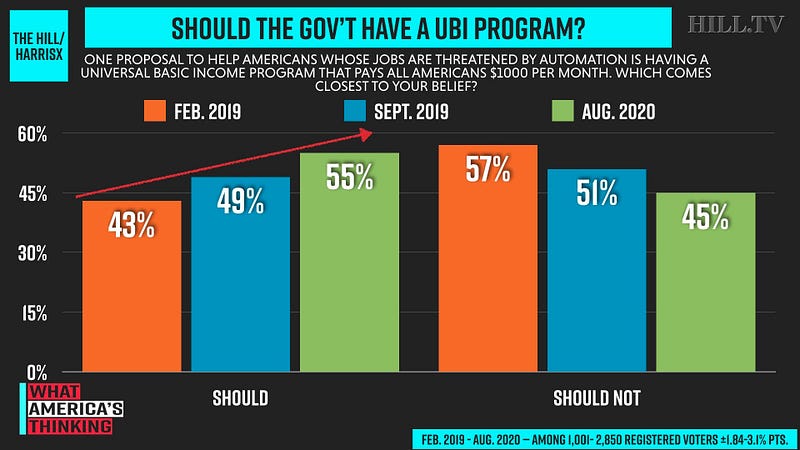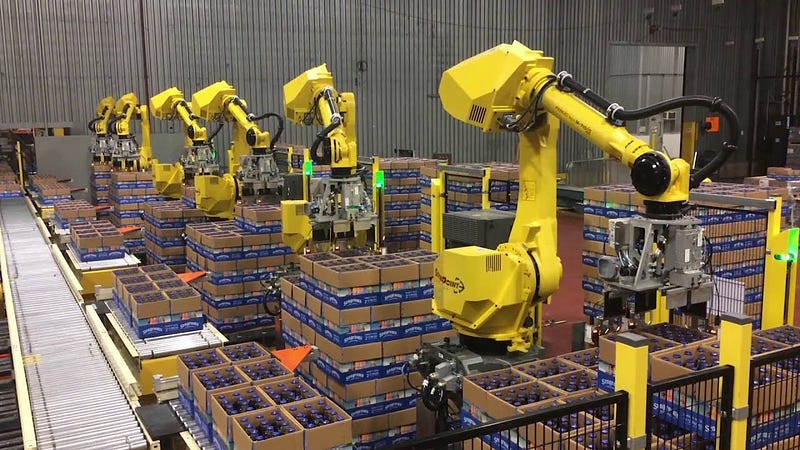A New Era: The Rise of Universal Basic Income in America
Written on
Chapter 1: The Genesis of UBI
In early 2019, as over two dozen Democratic candidates began their presidential campaigns, young entrepreneur Andrew Yang, who was polling under 1%, proposed a groundbreaking idea: a monthly dividend of $1,000 for every American adult. At that time, such a concept seemed as likely as the U.S. declaring war on Canada.
Fast forward to 2020, the onset of the pandemic and the subsequent economic downturn led to the first-ever widespread direct payments from the government in U.S. history. These payments were met with immense popularity and gained bipartisan support.
While the checks were modest—$1,200 in March, $600 in December, and $1,400 anticipated—these actions marked a significant shift in American life. The once-unthinkable idea that the government could distribute cash directly, without intermediaries or conditions, has the potential to reshape our political landscape. History shows that once citizens experience a relief program, they often resist its removal.
The Political Landscape of UBI
Universal Basic Income (UBI) is frequently linked to progressive ideologies. Indeed, Yang's proposal garnered backing from prominent figures like Robert Reich, Keith Ellison, and even Pope Francis. Currently, a substantial majority (71%) of Democrats endorse UBI, in contrast to a minority (34%) of Republicans. However, these figures are rapidly changing, as bipartisan interest in the issue grows.

Recent polling indicates a surge in UBI's popularity across the political spectrum. Conservative thinkers such as Milton Friedman and Charles Murray have also supported the idea. UBI aligns with the long-standing conservative aim of simplifying welfare systems, replacing them with a straightforward income that encourages independence and accountability. The universal aspect of UBI alleviates concerns about "redistribution" among conservatives. As Friedman stated: “It’s a system which would have the effect of eliminating the separation of a society into those who receive and those who pay, a separation that tends to destroy the whole social fabric.”
With the evident success of the 2020 direct payments, political insiders are becoming more receptive to the idea. For instance, Mitt Romney has proposed a universal income for families with children, offering $350 monthly for each child under five and $250 for those aged six to seventeen. Meanwhile, progressives like Ed Markey and Bernie Sanders advocate for $2,000 monthly for all Americans during the pandemic. Influential figures like Elon Musk, Jack Dorsey, and Joe Rogan have also expressed support for some variation of UBI.
The Rationale Behind UBI
In a world increasingly dominated by automation, UBI presents a compelling solution. As technology advances in production, distribution, and time management, the need for human labor continues to decline. This trend is evident throughout history; the purpose of technological innovation—from the plow to the steam engine to computers—is to simplify our daily tasks.
However, as industries such as transportation, storage, and manufacturing undergo rapid transformation, many individuals will inevitably lose their jobs. While precise predictions are challenging, studies suggest that automation could displace up to one-third of the American workforce by 2030.

We can perceive technology as a net advantage that grants humanity the freedom to work less over time, but to realize this benefit, we must utilize part of the productivity gains to establish a safety net. Yang refers to this as “human-centered capitalism.”
However, the specifics of any UBI proposal are crucial. A bill that comes with significant cuts to Social Security and Medicare differs greatly from a straightforward direct payment. The definition of a “living” income will also spark intense discussions. Personally, I believe that if existing welfare systems remain intact, a monthly payment of $1,000 is more than adequate. I remain wary of proposals that appear populist but serve as veiled reductions in benefits—this is likely the type of UBI that conservative “deficit hawks” would support.
Many individuals assume that UBI is financially unfeasible, but it might be more achievable than anticipated. Let’s quickly examine the numbers: ($1,000 per month) * (12 months) * (~250 million adults) equals approximately $3 trillion annually for UBI. There are various approaches to generating this amount, depending on priorities.
Reversing the tax cuts from 2017 and phasing out specific tax breaks could yield up to $1.5 trillion each year. Even a modest reduction in the U.S.'s substantial military budget could save hundreds of billions. Additional revenue could be generated by removing the cap on the Social Security payroll tax, implementing a financial transactions tax, among others. This all assumes that politicians genuinely care about the budget (which is often not the case).
The impact of UBI on economic growth and individual well-being remains a topic of active debate. Personally, I find the evidence from UBI trials in Alaska and Europe to be promising. Research indicates that UBI enhances happiness, stimulates consumer spending, and does not diminish personal motivation.
The Future of UBI in America
One thing seems certain: the U.S. will likely adopt some form of universal income within the next decade. As millions of citizens confront the realities of automation, the demand for such government intervention will grow. Unlike many progressive proposals, UBI has not been outright dismissed by billionaires and leaders of major corporations. When influential figures like Jeff Bezos, Mark Zuckerberg, and Elon Musk back an initiative, it often stands a strong chance of becoming a reality.
America already has a universal income system for citizens aged 65 and older, known as Social Security. It is not unreasonable to envision a future where we have Social Security for all.
The video "Building a Better Future: The Universal Basic Income Solution" delves into the potential benefits and implications of UBI, highlighting the transformative power it could hold for American society.
The video "Will UBI Solve AI Job Disruption?" explores the intersection of automation and job displacement, discussing whether UBI can effectively address the challenges posed by technological advancements.